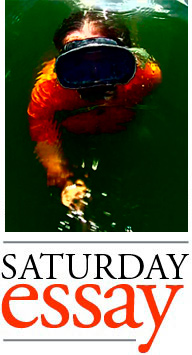Convivial Memories of an Epicurean Hedonist Con Mucho Gusto
 My whole life was organized around going out for drinks. The party’s over.
My whole life was organized around going out for drinks. The party’s over.
The Duluth art and music scene seems preserved in amber. I can see it in my mind’s eye from every angle, but I can’t touch it.
Has the virus infected time?
I was days away from participating in a group art show in Duluth Coffee Company and its Roasteria taproom. The Facebook event page was hours from launching. All the art is on the walls. I left a hammer there I was going to go back for, just before the stay-at-home orders unfolded. It’s probably right where I left it, timelessly suspended as if let go by an astronaut in orbit.
The Embassy art-church had just opened, promising untold events, unseen sights, and unheard sounds. It reached as if for the hand of God in the Sistine Chapel — a frozen gesture.
The week-long schedule for the 2020 Homegrown Music Festival had been completed, and you could taste growing anticipation for it in the air before it was canceled. That schedule was released, and we look at it helplessly, as if under glass or through a mirror. It is a perfectly delineated Bacchanalian festival that will never occur. I can almost remember attending it in an alternate timeline, my pseudo-memories a pastiche of unrealized desires.
In 2004 my marriage fell apart. Separated but not officially divorced yet, for a couple months in that overlap l co-habitated on the Hillside with my soon-to-be-ex-wife. It was a miserable situation, but our house could be run like a duplex, and so I lived upstairs and she downstairs. The house (which I still live in) felt like a monument to what should have been, a museum of broken hearts. I began leaving on foot at night. I wallowed in suicidal ideation; home felt like death. I fled from that, but also ran toward something.
That something was the conviviality of the music and art scene (“conviviality” from the Latin convivialis festal, meaning “to live and eat together as at a festival”).
Like similar communities throughout history, you could find a considerable cross-section of this scene at the local bars, taphouses, distilleries, cafes, restaurants, and coffeehouses. Those places host many of the city’s art spaces and stages. There a lively, vital people got loose, got animated, and dug into life con mucho gusto — “with pleasure.”
An Etymology of Pleasures
“Gusto” is such a great word. It shares a Latin root (gustus = taste) with “gustation,” “gustatory,” etc., as in to eat and drink — and the pleasures thereof. The word means enjoyment, vigor, zest. Its opposite, “disgust,” is to feel like throwing up: the anti-taste. I have the feeling (and I am only an amateur etymologist) that the word “guts” is derived from gustus also. To “puke your guts out” is one transposed letter away from to “puke your gust out,” which no one says, but the meaning would be clear if they did — to disgorge food and drink. Maybe it used to be said. They are literally the same word, uniting eating with pleasure at a chemical level. That unity sustains life: things we need, like salt, are delicious.
And beer. Beer is a grain storage system. It is food. And life. It was a method of payment in the ancient world. The modern cult of beer — like the ancient one — is sun worship, earth worship, life worship.
Wine too, which cannot be disentangled from Bacchus-Dionysus and the festivals of the deep past that give us the word “bacchanalian.” Meaning: drunken revelry, riotously drunken. For the ancients, the Bacchanals were well-organized festivals, ecstatic states of life lived to the fullest, honoring the divine.
“Bacchanalian” is similar to the word “hedonistic;” each implies a no-limits theory of partying to excess. Hedonism as a philosophy reaches for pleasure as the greatest good — a kind of atheist bacchanalianism. But in everyday use, hedonism implies selfishness. A bacchanalian is likely part of a group. A hedonist can be a loner.
“Epicurean” is more my style than hedonism. Epicureanism is named after Epicurus, a philosopher in ancient Greece who lived for pleasure but not to a destructive extent. Epicureanism is a calculus of pleasure vs. pain, erring on the side of pleasure in the long term. It is sustainable.
For example, a pure hedonist might do heroin because it is the greatest pleasure. A pure epicurean would never do heroin because — although living for pleasure — heroin will destroy your life. An epicurean would never countenance living in the gutter for the sake of addiction to heroin’s orgasmicity. An epicurean would say that living for a short time in squalor is too great a sacrifice. A moderate approach is better because, although the pleasure is less orgasmic, it is sustainable. Better to have manageable habits that enable more pleasure in the long haul. Let’s just have a couple drinks with dinner, maybe smoke a joint, etc.
Live for pleasure, but keep a lid on it. That is closest to my practice. I am a “mindful drinker” in the parlance of the day. Outright drunkenness is unpleasant. The social nature of alcohol is what appeals to me. The festival-like conviviality of the art and music scene is heightened by this city’s intimate size. We really do all live together. With the prevalence of live music, I imagined Duluth as hosting a party which never ended. And sometimes, if you combined that feeling with an actual festival — like Homegrown — things could get downright bacchanalian.
The Vitality of Scenes
Walking home from the beach, some of the state’s finest establishments lay between me and my house of death. I always had a book on me, or a sketchpad, or my laptop, so if I didn’t have a chance encounter with someone I knew, I could work on my projects. But I always knew someone.
Duluth’s service industry workers (of which I am one thanks to my 20-year-employment at Whole Foods Co-op) are also its musicians, artists, filmmakers, dancers, and fans. I could walk into any venue and feel at home, like I was part of something happening, or something about to happen. I know many of you felt the same way.
One of humanity’s greatest traditions is the tight-knit art/music scenes in bars, cafes, and coffeehouses. These places have always buzzed with important discussions, strained against boredoms, incited dramas, and percolated revolutions.
Think of how coffeehouses were often outlawed in their early days because the patrons would sit around and talk — they were trouble. Think of Greenwich Village, the bohemian enclave in New York City that spawned music and cultural movements throughout the 20th Century; think of its Stonewall Inn, one bar with a scene that changed history. Think of the Cabaret Voltaire in 1916 Zurich — a solitary nightclub open for less than a year, but whose art and music scene was so exciting, the international art movement Dada grew from it, and we’re still talking about it. Or the Paris bar/cafe scene of the 1920s, seething with the creative ferment of Gertrude Stein, Alice B. Toklas, Hemingway, Anais Nin, Henry Miller, Picasso, etc. Or the expatriate scene in 1940s Tangiers, with Paul and Jane Bowles at parties with the Beats. There weren’t that many people total in any of these scenes. But they had an outsized influence because they had an outsized vitality.
In the late 1700s, artist-poet William Blake took up with a small group of Swedenborgians (named for the philosopher Swedenborg), and challenged the stultifying religion of the day. Making his own prints that combined words and pictures, his small-run books were not only the first ‘zines, but the first graphic novels. Blake called London “Infinite London” and never left it. He wasn’t just talking about London. His point was that every location reflects Heaven, and every time reflects infinity. I feel this in Duluth, about its shores, green spaces, bars, restaurants, and stages. Its music and art scene gives us the divine spark of the Bacchanal, and of the convivius festal. We’ve shared Blake’s ecstasies in modern times.
The Scourge of Puritanism
When the stay-at-home order was given, and the list of essential businesses was released, I saw a Facebook comment: “Liquor stores are not essential!”
I’m all for sobriety. The nascent rise of sober bars is a positive addition to scenes everywhere. I look forward to sober bar events when the spool of time unwinds again. Just like other bars, sober bars are centers of conviviality, art, and music.
But can you imagine being the hateful person who made this Facebook comment? Liquor stores are essential. We’ve tried prohibitions. Life will come out. Can you imagine being the dour monster who would shut down liquor stores in the middle of the most depressing public crisis of our lifetime?
I mean it. Let’s take a hypothetical example of what millions are going through. Let’s say there are parents of young children who now must all stay at home together 24 hours per day. You would deny these parents the ability to relax with a glass of wine at dinner, if they should wish it?
You would deny a nurse a cold beer after work? Really?
Liquor stores may not be essential, but neither is self-righteousness.
You might as well say, conversation is not essential. Or, art is not essential. Or, being “sober” is not essential. For certain, being holier-than-thou is not essential.
Think of all the things that are “non-essential” to such a Puritan. Are pets “essential?” Are your favorite foods “essential?” What kind of personality disorder takes it upon themselves to compile a list of what you should be not be doing, during a global crisis, just because they are not doing it?
The modern-day Puritan must not be allowed to define the word “essential.”
Carnival
Spoiled on the intimate Austin, Texas of the 1980s and ’90s, I moved around the country seeking to replicate those pleasures elsewhere. The Duluth music/art scene made me stop looking.
The musicians and artists, and this community of friends and lovers and associates and comrades and bar owners, bartenders, baristas, and waitstaff … everyone was in a band. My ex was averse to bars, and I never loved bars per se. But I have always loved live music. And art. And the pleasures of food and drink, like our entire human lineage.
One of my favorite sights in this life has been the sidewalk scene outside of Carmody Irish Pub on summer nights after bar close, before everyone dispersed and went home. I know it happened elsewhere too, but outside of Carmody, it was acute. The conversations simply didn’t end. No one wanted to say goodnight. The energies crackled. It was boisterous, unruly, drunken, smoky, hedonistic, and lively, as in: full of life.
I didn’t even have to be a part of it, it still gave me a jolt of life. Like those nights when I’d be walking home from some other venue past 2 a.m., and my route would take me through the Carmody sidewalk scene. Not even stopping, except to say hello to any compatriots, it gave me a contact high. A high not of intoxication (that too), but of sharing life.
Even better than that — by a factor of 100! — were those Homegrown nights when all the shows had just ended, and the downtown venues emptied their revelers onto the sidewalks. Those were nights when Duluth really was a giant party. The word that fits it best is carnival. The word is from the Latin carn levare meaning “meat removal” i.e. to feast. Carnival now means “merrymaking” — sometimes for a whole season! — or, “a riotous excess” of food, drink, and living.
Downtown is not the whole of Duluth, but it is the savage heart of the city, and all cities. Right at the edge of the lake, which gives us the horizon meeting the sky — like Blake saw infinity in London.
The epicurean traditions of art and music in bars and cafes have come to us on a river of time that has quit flowing. We’re left catching flashes of life through livestreaming at home, light bending around a black hole.
“Every evening I make 16 solid half-hour friendships”
— Rodriguez, “Cause”
-All my essays here.
Recommended Links:
Leave a Comment
Only registered members can post a comment , Login / Register Here














1 Comment
Helmut Flaag
about 4 years ago